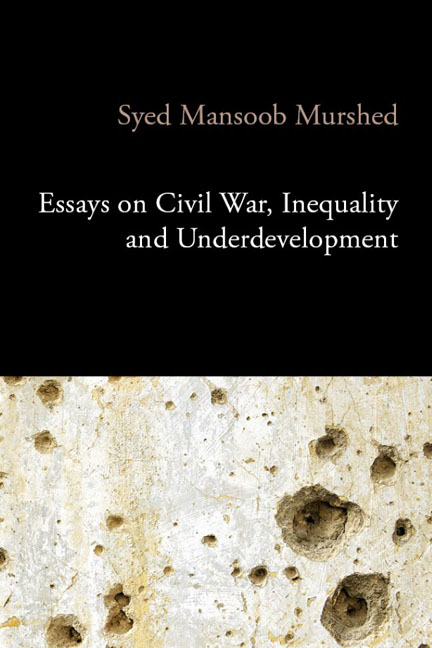Book contents
- Frontmatter
- Contents
- Preface
- Tables and figures
- 1 Conflict, civil war and underdevelopment
- 2 Revisiting the greed and grievance explanations for violent conflict
- 3 Greed, grievance and globalization
- 4 Economic dimensions of the liberal peace and its implications for conflict in developing countries
- 5 Enforcing peace agreements through commitment technologies
- 6 The conflict–growth nexus and the poverty of nations
- 7 Conflict and fiscal capacity
- 8 Does civil war hamper financial development?
- 9 The clash of civilizations and the interaction between fear and hatred
- 10 Transnational terrorism as a spillover of domestic disputes in other countries
- 11 Quantitative restrictions on the flow of narcotics: supply and demand restraints in a North–South macro-model
- 12 Spatial-horizontal inequality and the Maoist conflict in Nepal
- 13 Socioeconomic determinants of everyday violence in Indonesia: an empirical investigation of Javanese districts, 1994–2003
- 14 Not loving thy neighbour as thyself: trade, democracy and military expenditure explanations underlying India–Pakistan rivalry
- Acknowledgements
- References
- Index
1 - Conflict, civil war and underdevelopment
Published online by Cambridge University Press: 09 January 2024
- Frontmatter
- Contents
- Preface
- Tables and figures
- 1 Conflict, civil war and underdevelopment
- 2 Revisiting the greed and grievance explanations for violent conflict
- 3 Greed, grievance and globalization
- 4 Economic dimensions of the liberal peace and its implications for conflict in developing countries
- 5 Enforcing peace agreements through commitment technologies
- 6 The conflict–growth nexus and the poverty of nations
- 7 Conflict and fiscal capacity
- 8 Does civil war hamper financial development?
- 9 The clash of civilizations and the interaction between fear and hatred
- 10 Transnational terrorism as a spillover of domestic disputes in other countries
- 11 Quantitative restrictions on the flow of narcotics: supply and demand restraints in a North–South macro-model
- 12 Spatial-horizontal inequality and the Maoist conflict in Nepal
- 13 Socioeconomic determinants of everyday violence in Indonesia: an empirical investigation of Javanese districts, 1994–2003
- 14 Not loving thy neighbour as thyself: trade, democracy and military expenditure explanations underlying India–Pakistan rivalry
- Acknowledgements
- References
- Index
Summary
Conflict is a feature of human society since time immemorial. Disputes that arise may be organized around social class, ethnicity, religion, region, or some combination of these factors. The struggle can be over economic opportunities, as well as political and civil rights, among other contestable factors. In peaceful societies, conflict is channelled into non-violent means and institutions for both its expression and resolution. Economic and human development cannot occur without a large measure of social stability, which in turn requires the nurturing of institutions for non-violent conflict resolution. Conflict in lowincome countries makes the objective of poverty reduction all the more difficult, since not only is growth retarded, public money is taken for military spending from basic social services, and the poor are themselves disproportionately the victims of conflict. Economists are increasingly concerned with how badly designed economic policy raises the vulnerability of low-income developing countries to conflict, and how economic policy reinforces, or weakens, the social contract that underpins peace. Fundamentally, violent internal conflict is a symptom of the absence or breakdown of the implicit or explicit social contract that sustains peace.
Traditionally war has been viewed as an irrational act, brought about by misunderstanding and coordination failure, and primarily a breakdown in relations between nation states. Today most armed conflicts occur between groups within the same nation state, and in the developing world. A common view is that civil war is fundamentally irrational, and therefore not amenable to the techniques of economics or rational-choice political science. But is this so? Once the interests of belligerents are taken into account, conflict may be the product of rational decisions, even if it is only of a bounded or myopic rational choice variety. Even a terrible genocide, as in Rwanda for instance, is often planned well in advance in a cold, pre-meditated manner and carried out to meet a well-defined objective. Furthermore, evidence is accumulating that socio-economic variables, such as the desire to control natural resource rents, social fragmentation, poverty, inequality, and institutional breakdown, all play a role in contemporary civil wars. Economic analysis, particularly fields dealing with endogenous public choice, has much to say about these matters.
- Type
- Chapter
- Information
- Publisher: Agenda PublishingPrint publication year: 2021



